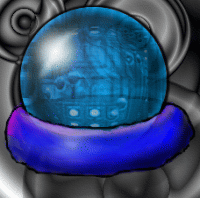The Future is Bright
Created | Updated Nov 5, 2003

A brief introduction: I wrote this in response to a speech
I heard about how nice the future would be all because of technology. Predictions about the future are almost invariably inaccurate, and none more so than this. But I hope it's amusing, at least.
Houses and housing are not the only areas in which significant progress has been made. For instance, disease has now been almost completely eradicated in First World countries. As a consequence, however, any remaining disease is likely to be one that drugs can't kill and be hardier. The lack of disease means that peoples' immune systems are less efficient anyway, so a disease contracted is almost
guaranteed to be fatal. It doesn't matter though, you can spend your remaining days visiting the countries you always wanted to from the privacy of your home, surrounded by virtual family members (and butlers).
No-one foresaw the collapse of the health service either. After disease was nearly eliminated and health and safety regulations were tightened up - yes, they all laughed when posters in glass doors were banned! Well, they aren't laughing now. No-one has been injured by a door since that unfortunate incident in Texas with the incorrectly placed opossum. The fact remains that as it is now virtually impossible to be injured or catch a disease, when you do get hurt or as previously mentioned, diseased, you've had it.
Physics made huge progress in the early part of the 21st century, perhaps in part thanks to the ceaseless efforts of the company Texas Instruments. However, later there was what is now described by historians as a 'Manual Weight Horizon'. Namely, the manuals for these various computers and calculators became so big, and with increasing trends towards ever-smaller computational devices, that devices were
actually being crushed by their very manuals. Needless to say, it was a tragic event. Following it, disenchanted physicists committed suicide in the thousands.
Travel is now not only unnecessary, but very strongly advised against - although in many cases, people feel they are left with no option but to travel. It is unnecessary because one can experience anywhere in the world from one's own living room, just by pressing the relevant buttons. Travel agencies have reacted incredibly well to this - perhaps too well. Realising that because nobody travels any more, they don't know what a place actually looks like, parts of Cambodia and
such started to look suspiciously like parts of Milton Keynes. For Milton Keynes residents, images of North Dakota became ubiquitous.
Travel, therefore, is becoming more and more popular. Unfortunately partly due to translation errors, and partly due to a miscalculation of the effects of foreign policy on a horrendous scale, one's usual reaction on seeing a foreigner is to hit them with a large fish - (usually a turbot, which can be quite hard to come by in a pinch) and then run away very fast. After a few tries, many tourists give up trying to get served, given a tour, or even just view a local landmark.
In fact, the natives of many lands are so xenophobic now that they prefer to launch their turbots from a distance rather than set eyes on a foreigner. This leads to difficulties identifying foreigners - it's hard to tell who's a foreigner without looking at them. As a consequence it is not unknown for everyday life to be interrupted by a shower of turbot.
This really sums up 21st century life - Long periods of
Milton Keynes punctuated by short periods of turbot.
No one ever thinks about the turbot though.
